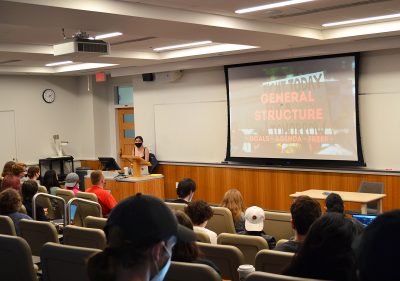
Boston University’s chapter of the Young Democratic Socialists of America held a town hall this Sunday where they invited activists from multiple student organizations to speak to an audience of approximately 40 students, alumni and faculty.
The meeting sought to build solidarity between faculty and students, share grievances between activists at BU and discuss goals for the foreseeable future.
Students were drawn together by a collective frustration towards the administration — many spoke on how they believe the University is not listening to them nor enacting change in response to their activism.
Examples included the administration’s refusal to provide free laundry following their monthslong campaign, as well as problems with gender-neutral and trans-inclusive housing on campus, among others.
In a May 2021 interview with The Daily Free Press, BU President Robert Brown stated firmly that he would not grant BU students free laundry.
“They have given me a petition, which I have responded to,” Brown said. “They have my response, there’s no need for a meeting. Because I’m not going to do it. Free for you [the students] means somebody else paid for you to do your laundry.”
Mariam AlAdsani, a senior in the College of Arts and Sciences and co-president of BU Students for Justice in Palestine, spoke about the club’s recent efforts in their fight for justice for Palestinians.
“Our mission here at BU is to really push for Palestinian liberation and autonomy and cut ties with Israel,” she said.
This week is Israeli Apartheid Week in North America — a week-long series of events throughout which activists to raise awareness about Israel’s oppression of Palestinians. The “Apartheid Wall” is a 700 kilometer wall that separates Israeli and Palestinian territories in the West Bank.
SJP is presenting Friday its “own version of the Apartheid Wall” in an attempt to raise awareness about the living conditions of many Palestinians in the occupied West Bank territory.
Also present at the town hall, representatives from the Queer Activist Collective spoke about their efforts to make gender-neutral housing more accessible on campus — noting a list of 10 written demands they updated Feb. on how to improve housing conditions for on-campus LGBTQ students.
“We’ve made these demands known to administration through multiple meetings in the fall and even in the spring semesters,” one member said. “However, we have been met with resistance.”
David Andrade, a student organizer and graduate student in the School of Social Work, said he believes students are valued more economically than democratically.
“Our money holds way more weight than our feelings and our thoughts to the administration,” Andrade said.
Students for Reproductive Freedom’s next goal is to begin a “doula collective” on campus, said Dillon Tedesco, CAS junior and vice-president of the organization.
According to DONA International, a doula is “a trained professional who provides continuous physical, emotional and informational support” to a mother throughout their pregnancy and childbirth. SRF’s “doula collective” aims to train people “to physically and emotionally support” those who go through miscarriages and abortions, Tedesco said.
Reverend Michelle Walsh, a lecturer in the SSW and member of the Service Employees International Union, spoke of the latter group’s recent success in agreeing on a new union contract for BU lecturers.
The union negotiated with the administration over the course of months to guarantee full-time faculty equitable pay, better job security and more reliable technology for classroom use.
“Of course, there’s more that needs to be done,” she said. “You want your professors not burning out from having to teach too many students within a particular classroom.”
The YDSA town hall concluded with an open-floor discussion in which all attendees were invited to discuss their experiences with administration.
Curtis Deese, a junior in the College of Communication, attended the town hall as an audience member and said that the meeting showed them that tangible change takes time.
“They didn’t really have any concrete changes yet, but they were embracing that rather than feeling bad about it,” Deese said. “It takes time to get to an actual change, but that’s the point.”
Alexia Nizhny, Grants & Awards Chair of The Daily Free Press, is the president of BU’s YDSA. She was not involved in the editing of this article.


















































































































